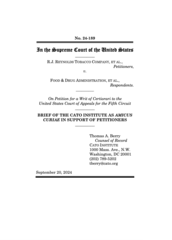Learn more about Cato’s Amicus Briefs Program.
In March 2020, the FDA issued a final rule mandating graphic warnings for cigarette packaging. These warnings would take up a significant percentage of the space on the packaging and would feature gruesome images in addition to text. RJ Reynolds, an American tobacco company, challenged the rule on First Amendment grounds. It argued that mandating such warnings violated its free speech rights by forcing it to act as a billboard for the government’s anti-smoking message. The FDA argued in defense of the rule that such warnings are permissible under a Supreme Court decision called Zauderer v. Office of Disciplinary Counsel (1985). In that case, the Supreme Court established a more lenient standard of review for “purely factual and uncontroversial” compelled disclosures.
Although a federal district court agreed with RJ Reynolds, the Fifth Circuit reversed, siding with the FDA and finding that the disclosures were justified under the Zauderer standard. Now RJ Reynolds has asked the Supreme Court to take the case, and Cato has filed an amicus brief supporting that petition.
In our brief, we argue that the Supreme Court should take this case to clarify the limits of Zauderer. In Zauderer itself, the Court permitted the government to compel speech to cure potentially deceptive advertisements. However, the lower courts have since expanded Zauderer to justify compelled speech in many other contexts, provided that the disclosure furthers a supposedly substantial government interest such as “the consumer’s right to know.” As we argue, Zauderer’s reasoning only makes sense when a disclosure is necessary to combat deception, and the Supreme Court should explicitly hold that Zauderer does not apply when there is no risk of deception.
Our brief explains that it is dangerous to give the government a free-floating power to use private property to spread the government’s message. Often, that message will reflect the political persuasions of whichever party is currently in power. When such disclosures are justified by nothing more than an interest in consumer education, there is no limit to what messages the government can impose.
The Supreme Court has held time and again that the First Amendment protects both the right to speak and the right not to speak. And that right does not disappear when a business is engaged in the marketplace. Expanding Zauderer risks putting any disfavored business in the government’s crosshairs as a potential tool to spread the government’s preferred viewpoint, inflicting a First Amendment injury on that business in the process. The Supreme Court should take this case and put a stop to the worrying trend of government commandeering private property to spread its own message.

This work is licensed under a Creative Commons Attribution-NonCommercial-ShareAlike 4.0 International License.

